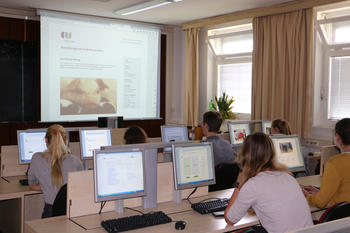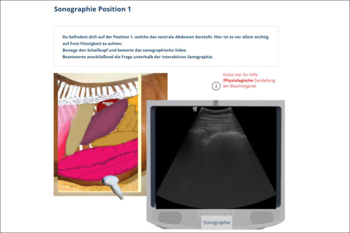A Virtual Look at Veterinary Practices
A new e-learning program called “QuerVet” helps budding veterinarians prepare for the multifaceted nature of their later professional lives.
Sep 18, 2017
Model learning: The QuerVet e-learning program lets students of veterinary medicine step into the role of a veterinarian in day-to-day practice, handling a wide range of different cases onscreen.
Image Credit: Lena Vogt und Alina Küper
The program has been a big hit with students; as one student said, “The cases are interesting, working on them is fun, and they stick with you.”
Image Credit: Lena Vogt und Alina Küper
Each case offers various multimedia materials, such as reenactments of conversations...
Image Credit: Screenshot QuerVet / tet.folio / CeDiS Freie Universität Berlin
... and animations, photos, and interactive elements such as virtual ultrasound.
Image Credit: Screenshot QuerVet / tet.folio
The illegal puppy trade is booming: Young dogs are brought to Germany from Poland, Bulgaria, Hungary, and Slovakia to be sold at rock-bottom prices. A purebred puppy can go for as little as 300 euros instead of 1,000 or more. “But people only think it’s a bargain,” says Christa Thöne-Reineke, a professor of animal welfare, animal behavior, and laboratory animal science at the Department of Veterinary Medicine, Freie Universität Berlin.
“The breeding conditions in these countries are generally disastrous, and there is no veterinary care.” The puppies are often severely ill, so many of them need to visit the vet just days after arriving in Germany, and not all of them will recover. This is a challenge even for experts: “What would you do if someone brought this kind of puppy into your office? And how could action be taken against illegal traffickers?” These questions are aimed at students of veterinary medicine as part of a new interactive project called QuerVet, which aims to make interdisciplinary questions a bigger part of the education provided in veterinary medicine.
The QuerVet e-learning project was developed last year by the Department of Veterinary Medicine in cooperation with the tet.folio team at the Physics Education Department and the Center for Digital Systems (CeDiS) at Freie Universität. The main people involved at the Department of Veterinary Medicine were doctoral candidates Veronica Duckwitz and Lena Vogt. The materials are provided via the tet.folio learning platform, so students can study anywhere, anytime. The platform can be used to access and work on interdisciplinary case studies from the day-to-day practice of veterinarians. Students later attend an in-person event on the same topic to discuss the content together.
From colic in horses to illnesses caused by food or the example of the illegal puppy trade discussed above, the cases show just how multifaceted the veterinary profession is, and what kinds of challenges it holds for everyday practice. To complete the exercises, students assume the role of the veterinarian and work on a certain case or examine a virtual patient. The goal is to complete the task or answer the question. All assignments are derived from a veterinarian’s day-to-day practice. The responses to the evaluation forms distributed at the end of the course show that the interactive teaching and learning concept has been well received by students. “Personally, I’m learning much more here than I do in a normal lecture,” one student said.
So far five e-learning cases have been produced in cooperation with eleven institutes and clinics at the department and made available for students in the 6th and 7th semesters to work on. One student had special praise for the program’s “attention to detail”: “The cases are interesting, working on them is fun, and they stick with you,” she wrote. Others indicated that they liked the flexibility of being able to work on the digital program anywhere, anytime, and the fact that they were able to use their theoretical knowledge on examples drawn from real-world practice.
The case studies have been prepared in multimedia form on the tet.folio learning platform, featuring reenactments of discussions, live recordings – from the clinic, for example – videos produced in a studio, animations, photos, exercises, and interactive elements such as virtual ultrasound. An extensive glossary provides further information to help students work on the case. Students receive feedback on their proposed solutions. When they make mistakes, they are given guidance to put them on the right track.
Technical support is provided as well; if there are any questions or issues, the QuerVet team is available to help via discussion forum or e-mail. Each case culminates in a short, non-binding final exam. This lets students check their newly acquired knowledge, and instructors can see whether the students have reached the learning objectives set for the program.
“This is a really great and interesting way to implement e-learning as part of a degree program,” wrote one student who had worked with QuerVet. Another added, “It would be awesome if there were more exercises like this in the future. Hopefully even for us, not only in future semesters!” He will soon get his wish because further case studies are in the planning stages, in close coordination with the experts from the various disciplines and the courses offered during a particular semester.
Further Information
- Veronica Duckwitz, Department of Veterinary Medicine, Institute for Veterinary Epidemiology and Biostatistics, Email: vduckwitz@zedat.fu-berlin.de
- Lena Vogt, Department of Veterinary Medicine, Institute for Veterinary Epidemiology and Biostatistics, Email: lvogt@zedat.fu-berlin.de




